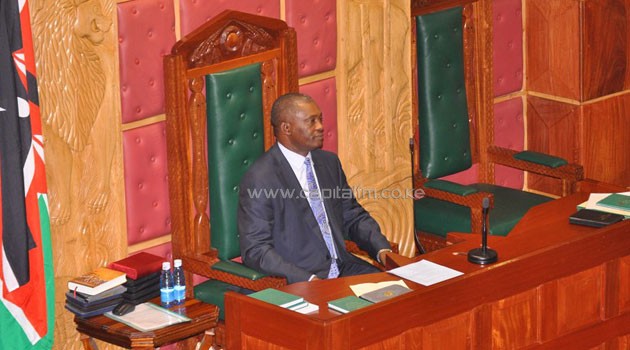
National Assembly Speaker Justin Muturi informed the House that the Procedure and House Rules Committee has began reviewing Standing Orders to allow members of the Executive and other arms of government a special sitting to answer questions/FILE
National Assembly Speaker Justin Muturi informed the House that the Procedure and House Rules Committee has began reviewing Standing Orders to allow members of the Executive and other arms of government a special sitting to answer questions.
“The effect of the proposed review of the Standing Orders is to have special sessions of the House to enable Cabinet Secretaries to appear in the House to respond to members queries directly,” he said.
He announced that he expects the new guidelines to be in place when the House resumes from its first break after the reading of the 2014/15 budget.
“It (special sessions) will also afford the Cabinet Secretaries a forum to explain any aspect of the government policy in addition to those initiated by the Leader of Majority Coalition,” the Speaker stated.
Most MPs have often complained that it has proved difficult for questions to be satisfactorily answered because chairpersons of the House Committees are the ones who usually deliver responses after interrogating Cabinet Secretaries and cannot be held accountable.
Muturi said the Procedure and House Rules Committee which is mandated with proposing rules for the orderly and effective conduct of committee business will engage stakeholders and come up with rules that will enable the House work coherently.
“Initial findings have revealed that although presidential systems do not possess the same procedures for the routine questioning of ministers as parliamentary ones; such systems have a variety of devices for obtaining responses from ministers including regular question times. This is the case in Rwanda, Senegal, Chile, Brazil, and Philippines to mention just a few,” Speaker Muturi explained.
If the amendment carries the day, the House might see the return of a feature that is reminiscent of the popular ‘Question Time’ where Members of Parliament put questions to government ministers which they are obliged to answer. It usually occurs daily while Parliament is sitting.
Question Time was dropped after the passage of the Constitution in August 2010, which replaced the hybrid system of government (which allowed ministers to sit in Parliament as elected members of the Legislature) with the presidential system, (which seeks to recognise the principle of separation of powers between the Executive and the Legislature).
This excluded Cabinet Secretaries and the Attorney General (who enjoyed ex-officio status under the previous system) from the Chamber.
Instead, queries filed by various MPs or Senators were compiled and forwarded to the relevant departmental House committee, which summoned the respective Cabinet Secretary to address the issues.
The MPs who file the questions are allowed to participate in the committee proceeding and seek further clarification.










































